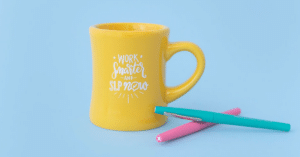Listen on Apple Podcasts Listen on Spotify
This Week’s Episode: Why SLPs Need to Understand Sensory Processing
I am so incredibly excited to have Jessie Ginsburg joining us today. We are in for such a treat. Jessie is the founder of Pediatric Therapy Playhouse, a multidisciplinary clinic in Los Angeles. She’s also contributed in a bunch of other publications. You’ve probably seen her in the ASHA Leader.
I brought Jessie on today and I’ve asked her to share some really amazing tips that I’ve been able to use and implement with my caseload.
Today is a crash course in sensory strategies for the SLP and we’ll break it into four segments for this month’s podcast series.
We’re going to start off this week’s episode by chatting about why SLPs need to understand sensory processing. I’m really excited for you to hear a little bit about Jessie’s story, because I think she has a really amazing journey and I’m excited to share that with other SLPs.
Let’s get to it!
Key Takeaways + Topics Covered
✓ Transform your session with the unconventional by taking into consideration your child’s sensory needs
✓ Saw transformations when co-treat with OT (sensory strategies)
✓ Jessie got her Sensory Integrations Certificate USC which is typically only for OTs with graduate degrees – but she was able to sneak in and now she has a passion to teach SLPs to implement strategies
The Whole Brain Child by Daniel J. Siegle and Tina Payne Bryson
>> When our brain gets dysregulated it’s like a seesaw isn’t balanced
>> downstairs brain – automatic responses
>> upstairs brain – language
>> When we are dysregulated some kids get trapped downstairs
>>How do we help our kids feel safe and secure and regulated? Keep the pressure off of the activity at hand and all of these other skills can come out.
Additional Links
The Whole Brain Child by Daniel J. Siegle and Tina Payne Bryson
Jessie Ginsburg on Instagram: @jessieginsburg.slp
Jessie’s Sensory Certificate Program
Next Up in this Pod Series
5/3/22: A Crash Course in Sensory Strategies for the SLP: The Why
5/10/22: A Crash Course in Sensory Strategies for the SLP: Our Role
5/17/22: A Crash Course in Sensory Strategies for the SLP: Levels of Arousal
5/24/22: Crash Course in Sensory Strategies for the SLP: The Optimal Learning Zone
Subscribe & Review on iTunes
Are you subscribed to the podcast? If you’re not, subscribe today to get the latest episodes sent directly to you! Click here to make your listening experience auto-magic and as easy as possible.
Bonus points if you leave us a review over on iTunes → Those reviews help other SLPs find the podcast, and I love reading your feedback! Just click here to review, select “Ratings and Reviews,” “Write a Review,” and let me know what your favorite part of the podcast is.
Thanks so much!
Transcript
Speaker 1: Hello there and welcome to the SLP Now Podcast, where we share practical therapy tips and ideas for busy speech language pathologists. Grab your favorite beverage, and sit back as we dive into this week's episode. Hello there, and to the SLP Now Podcast. I am so incredibly excited to have Jesse Ginsburg joining us today. We are in for such a treat. Jesse is the founder of Pediatric Therapy Playhouse, a multidisciplinary clinic in Los Angeles. She's also contributed in a bunch of publications. You've probably seen her in the ASHA Leader. She's done tons of different presentations and she also has an amazing series of courses now, right Jessie?
Jessie: Actually the first one was discontinued so that we could focus on the recent one.
Speaker 1: Oh, awesome. So maybe if we have a little bit of time, we can dive into that, but I brought Jessie on today... If you don't follow her on Instagram already, you definitely should. But she shares some really amazing tips that I've been able to use and implement with my caseload. And so I was like, "We just have to share this with more SLPs." Today is a crash course in sensory strategies for the SLP and we'll break it into four segments. So we're going to start off just by chatting about why SLPs need to understand sensory processing. And I'm really excited to hear a little bit of your story, Jessie, because I think you have had a really amazing journey and I'm excited to share that with other SLPs.
Jessie: Thank you so much for having me. I'm so excited. And I know I was telling you this before we started recording, but I'm just so impressed. And I feel like you were just one of the first to get out there and do an SLP podcast and it's lasted for so long. It's so awesome to see you continue to do it.
Speaker 1: It's been a lot of fun. I love nerding out and getting to talk to really cool people like you, so it's just much fun for me as it is for the SLPs who listen.
Jessie: Yeah, definitely. And I know we've talked a lot recently because I think... Did you come to one of my free sensory intensives?
Speaker 1: Yeah. I signed up for one of your courses.
Jessie: The sensory course?
Speaker 1: It's the ASD from the inside out. I don't know if that's the one that you discontinued.
Jessie: Oh yeah, that was beforehand. Oh, how cool. Okay. I didn't even know that, but I really have gotten into the sensory world because I've just have seen such a need for SLPs to better understand this topic. And it's funny when we talk about how we get started in our journey, like you were mentioning, and I don't know if you feel like this too, where it's like one coincidence in your life has led to the next and all of a sudden you wake up and here you are.
Speaker 1: 1000%. I can totally relate to that. I've never phrased it like that, though. I love that. Just the coincidence, and then you wake up and...
Jessie: It's funny because I was just listening to a podcast last week and they said, "You're just one decision away from changing your entire life." And I thought it's so funny, but ironic how you don't know what those decisions are in the moment, it's something that you come to find years later when you look back on your life. Do you watch The Office?
Speaker 1: I've watched a little bit of it. It's been a while though.
Jessie: This was reminding me of one of the characters, Andy, the name in real life is Ed, I think. He was in The Hangover, the one who lost his tooth in The Hangover, but there was this reel that was going around Instagram recently that was a very popular audio and my partner, Chris pointed it out to me. I didn't know it was from The Office, but the phrase of the audio was, "I wish there was a way to know you were in the good old days before you've actually left them." That was good, but it kind of same thing. It's like you don't really realize in your life, these defining moments that are always happening to you until you look back and then all of a sudden you're where you are and you come to appreciate, and it's usually the tough times too, that are those defining moments.
Speaker 1: Yeah, absolutely.
Jessie: So when I graduated college, I, like many people had no idea what I wanted to do with my life. I wasn't convinced yet that I wanted to go into speech, but I had enough hours to get my SLPA license, my assistant license, because at the time it was just having a matter of observation hours and you could apply for your license. It was a lot different then. So I went and I'm looking for jobs all over Los Angeles, sending out my resume, getting almost zero interviews. But I got one at this multidisciplinary clinic and they brought me in for the interview. They were giving me a tour of the clinic and they said, "Here's our gym where we do OT. Here are the rooms we do speech. Here are the rooms we do floor time therapy. And if you work here, you will also be doing, in addition to speech, you'll be doing floor time therapy. You know what that is, right?" And I just smiled and nodded then I accepted the job on the spot because it was my only offer out there. I wasn't going to waste that opportunity.
Jessie: And then I get home and I Google 'what is floor time therapy?' Never heard of it. That is really one of those moments where if I had never taken that job and never jumped into floor time, there's no way I would be where I am today, doing what I'm doing today. Because for those of you listening, who aren't familiar with floor time, it's a really common therapy for autistic kids and all kids really. But it's just about supporting kids socially and emotionally, and really not only helping them regulate and develop engagement and language, but really helping them learn how to think for themselves, unlike other therapies where it's very prompt dependent. Floor time is all about helping kids to really think for themselves without relying on other people, to be prompting them all the time. That job was just a huge learning experience for me.
Jessie: And there's this little boy that I worked with and I still am in contact with his mom, but he was a three year old boy. He was not speaking. He would come into the clinic, just run through the clinic, run in everyone's therapy rooms. Everyone knew this kid because this was a kid that would just run in, pop in on anyone's therapy to go in, grab a toy out of their room. He was just very, very busy. And I saw him for floor time therapy. And I should mention that our sessions were three hours long. Have you ever heard of such a thing?
Speaker 1: That is a very long session.
Jessie: So it was a long session with this boy that I felt completely incompetent in treating. And then what the clinic would do is they would choose kids that they wanted to see and show footage to all the supervisors in the clinic. There were maybe 15 supervisors. So they said, "Hey, Jessie, we really want to see a clip from this kid's session." And I said, "Are you sure? Because I don't know if this is the best choice of a child." I mean, this was absolutely the hardest kid I was working with. I ended up filming and getting this incredible clip of him jumping off the little therapy table into my arms. And he was so engaged and he was having so much fun and we were just so connected. It was this beautiful moment looking back on and watching it.
Jessie: And I was so excited to submit it to them. I was like, "Oh my gosh, no one's seen him like this. This is going to be so cool to show them." And this is me as a completely insecure clinician. It's not like I thought I was great. I was not good at my job, I will tell you. So I was so excited to show them this clip and they watch it. And then the feedback was, "Well, why do you let him jump off the table? That's not safe." And I was just so heartbroken by that. I was so excited to share that. And then to get that kind of feedback, I was like, "Wow, it was missed. That beautiful moment we shared was missed." But that was just one of those kids where I look back and I realized that was when I realized how much you could transform your sessions when you are doing things that are just totally unconventional and you are really taking into consideration a child sensory needs.
Speaker 1: Wow. That's so powerful. And I love that quote, transforming your sessions with the unconventional. I totally butchered that quote, but why the concept? I love that.
Jessie: You just never know what's going to work. And I think that we put so much pressure on ourselves to produce results and get through activities when the bottom line, and the most important thing that we could do is really build a connection with our kids because that is what's going to make the biggest difference for them, not just in our sessions, but in their lives.
Speaker 1: So building those connections is what will make that difference?
Jessie: Yeah. So I can get into a little bit more about sensory regulation and why.
Speaker 1: Yeah, let's do it.
Jessie: So I just became just so... I guess you could say obsessed with sensory after that do job. I mean, that was what I wrote my grad school essay when I was applying to school. That's what I wrote my essay on because I saw such a change in my autistic kids when we started to do co treats with the OTs and I was learning these sensory strategies. So I just really dove in and did as much research and training as I could. And I went through the full sensory integration certificate program through University of Southern California, which is typically only for OTs who have their graduate degrees, but they let a few SLPs and other professionals sneak into their classes. And I knew I had to do that for myself and for the kids that I was working with. So now what I love to do is really teach other SLPs how they can integrate sensory strategies into their sessions so that they can have more effective sessions.
Jessie: The book, The Whole-Brain Child, if you've read it or any of your listeners, is so incredible at describing this, but we wonder why sensory regulation, why is it that when kids are dysregulated, they're not getting the most out of the session or we're not getting the most out of them. And what's really fascinating is what happens in our brain when we're dysregulated. And in that book, they described it really simply, which is a really cool analogy to be able to explain to parents or other professionals you're working with where they say, "Imagine that there's the upstairs and the downstairs brain and there's different structures in each of them." So it is physically an upstairs and downstairs as well in the actual brain. But basically the downstairs brain is responsible for these automatic reflexive responses. And basically your survival, so breathing, fight or flight, all of these automatic responses happen in our downstairs brain, whereas in the upstairs brain, that's where all of our logical thought and language comes into play.
Jessie: So what happens is that when we are dysregulated, it's almost like they say a baby gate being shut between the downstairs and the upstairs brain. And we get trapped in the downstairs and we cannot even get up there to access those upstairs skills. So when we think about a kid coming into our session, completely dysregulated, that child is in their downstairs brain. That child does not even have access to their language at that point. So how could we possibly expect that kid to sit down at a table and do some structured language activity when their body is not in a regulated state? Their body is not in a place where they're ready to learn in that moment.
Speaker 1: Wow. That is a really powerful analogy. That would be so helpful to share with parents.
Jessie: Yeah. Because I think that it's just so easy to put pressure on ourselves. I'm a parent, I have three tiny little children at home and you wonder like, "What is wrong with me? Why aren't they listening to me? What am I doing wrong?" But there's so many times when the answer is so simple, which is how can we help our kids feel safe and secure and regulated? Because once they do, that's when the magic happens, that's when all of these other skills are going to be able to come out.
Speaker 1: I love that. That's so powerful. How do we help our kids feel safe and regulated so that the other skills can come out? So good.
Jessie: In our speech sessions really taking the pressure off of, I think the activity at hand and focusing more on how can we get our kids feeling safe, how can we get them secure? How can we get them to trust us? How can we get them to connect with us? And if you put that at the forefront of your goals in therapy, you will see changes. That's just the fact. You will see greater changes over time, then when you come in with a plan and you've got to get a bunch of structured activities going.
Jessie: And there was this little boy I started seeing recently, undiagnosed autism and he's three. And I inherited him from someone else, from another SLP. And the first session, I just had these high expectations. It's like, "I'm going to do this, this and this." I read his goals. I assumed he was at a certain place in his language. And I had this whole plan in my head. I was frustrated the whole session because I wasn't getting what I wanted to get out of the session. And I took a step back and I completely changed my approach. And I just started following his lead, modeling language because he was a gestalt language processor. And the best thing that I could do when I realized that was really model language for him. And I really just started focusing on building a relationship with him.
Jessie: And it hasn't even been that long, but now he comes to the office, he gives me the biggest smile. When he sees me, gives me a big hug, we cuddle. I love this kid so much. I mean, he could be my own child. That's how much I feel like I connect with him. And those are the types of connections that we have to have when we really want to make the big difference in our kids lives.
Speaker 1: Yeah, absolutely. I definitely think you've convinced me of why we need to understand sensory processing, because like you said, it can just have such a big impact on our students. And I think it helps us feel... decrease our own frustration. Is there anything else that you would add to that recap?
Jessie: You're hitting all the main points here. One of the biggest questions I get from people is, "Why can we do this as SLPs? Why can we work on sensory regulation, or is that not within our scope?" Those types of questions. When you explain it like this with... when a kid is not regulated, they can't access their language. They can't learn. We know that it is within our scope to get them to a place where they're calm and they're attentive. And funny enough, I've had people ask me or tell me, I guess I should say, "You aren't trained in this. You shouldn't be working on this." And I was enrolled at the time in the sensory integration courses through USC. And when I say this program, this is not like a SOS feeding two day, three day intensive course. This was, I want to say a year and a half of classes, grad school level classes, assignments, quizzes, exams, the whole deal.
Jessie: So I remember asking my professor and she said, "You are here, you are learning these strategies and you're trained and you are 100% able to go out there and say, 'I am sensory integration trained.'" So for me, that was really, really validating.
Speaker 1: I think that makes a lot of sense. Sensory processing can definitely play a role, and a very pivotal role in the work that we do with our students. Thanks for listening to the SLP Now Podcast. If you enjoyed this episode, please share with your SLP friends. And don't forget to subscribe to the podcast to get the latest episodes sent directly to you. See you next time.
Sign up to receive email updates
Enter your name and email address below and I'll send you periodic updates about the podcast.




Reader Interactions